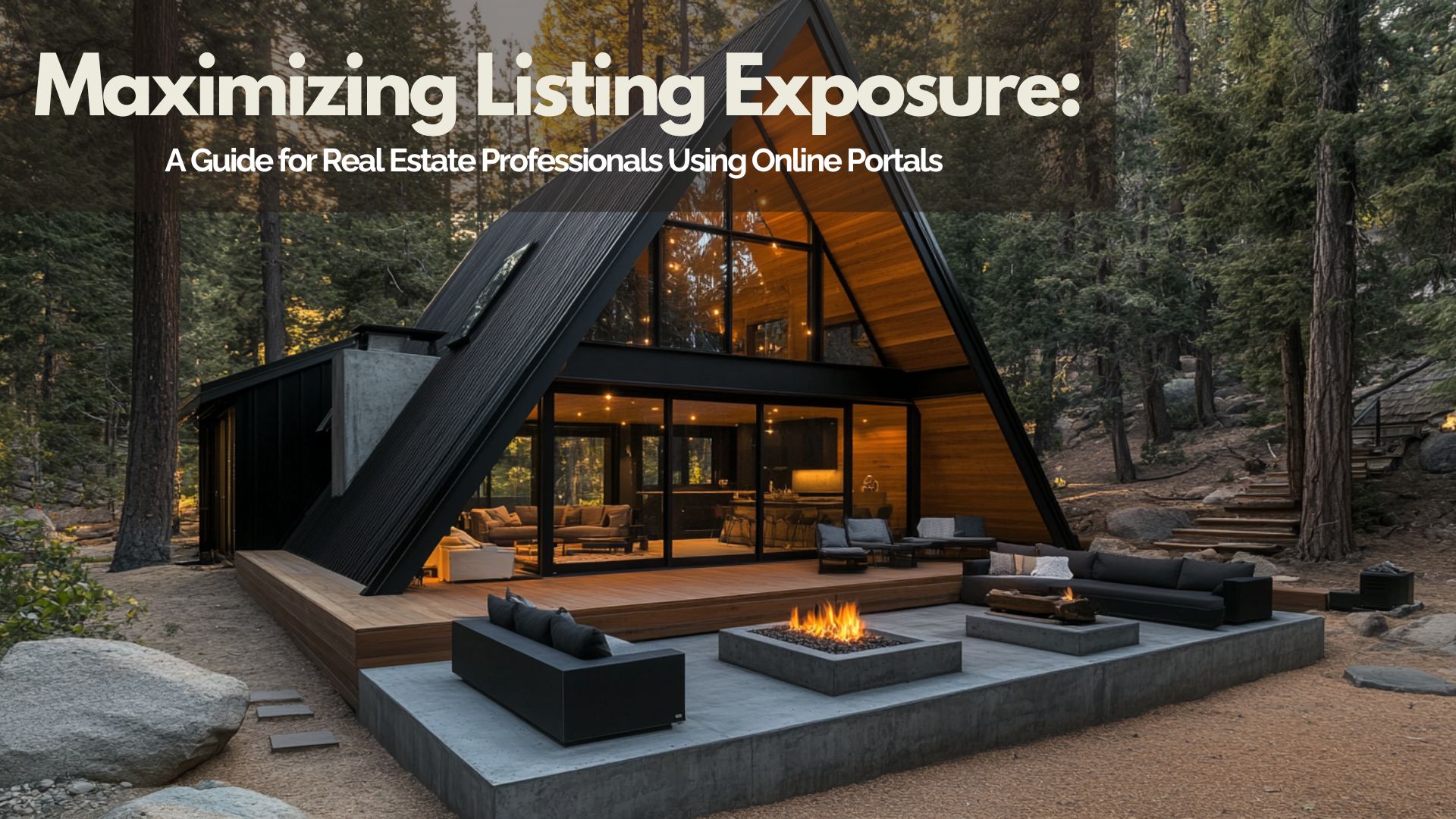Blog Article Title
Maximizing Listing Exposure: A Guide for Real Estate Professionals Using Online Portals
In today’s digital age, online listing portals and property search websites have become indispensable tools for real estate professionals. These platforms offer unprecedented reach and visibility, connecting properties with potential buyers across the globe. However, simply listing a property online isn’t enough. To truly harness the power of these portals, real estate agents must employ strategic approaches to maximize exposure for their listings. This comprehensive guide will explore effective techniques for leveraging online listing portals to their fullest potential.
Table of Contents
- Understanding the Importance of Online Listing Portals
- Choosing the Right Platforms
- Crafting Compelling Listings
- Leveraging High-Quality Visuals
- Optimizing for Search Engines
- Utilizing Advanced Features and Tools
- Maintaining Consistency Across Platforms
- Engaging with Potential Buyers
- Tracking Performance and Analytics
- Staying Updated with Platform Changes
- Integrating Online Listings with Your Overall Marketing Strategy
- Conclusion
Understanding the Importance of Online Listing Portals
Online listing portals have revolutionized the real estate industry. According to the National Association of Realtors, 97% of home buyers used the internet in their home search in 2020. This statistic alone underscores the critical role these platforms play in connecting buyers with properties.
These portals offer several advantages:
- Wide Reach: They allow properties to be seen by a vast audience, far beyond local markets.
- 24/7 Accessibility: Potential buyers can browse listings at any time, from anywhere.
- Detailed Information: They provide comprehensive property details, often including virtual tours and high-resolution images.
- Comparative Shopping: Buyers can easily compare multiple properties side by side.
Understanding these benefits is the first step in effectively utilizing these platforms to maximize exposure for your listings.
Choosing the Right Platforms
Not all online listing portals are created equal. While it’s tempting to list on every available platform, a more strategic approach often yields better results. Consider these factors when selecting platforms:
- Audience Reach: Research the monthly visitor count for each platform in your target market.
- Demographics: Understand which platforms are popular among your target buyer demographic.
- Listing Features: Evaluate the tools and features each platform offers for showcasing properties.
- Cost: Compare the pricing structures and determine the best value for your budget.
- Integration: Check if the platform integrates with your existing CRM or marketing tools.
Popular platforms like Zillow, Realtor.com, and Trulia are often go-to choices, but don’t overlook niche platforms that cater to specific property types or buyer segments. For luxury properties, for instance, sites like Mansion Global or LuxuryEstate.com might be more appropriate.
Crafting Compelling Listings
Once you’ve chosen your platforms, the next step is to create listings that captivate potential buyers. Here are key elements to focus on:
-
Engaging Headlines: Use descriptive, benefit-oriented headlines that highlight unique selling points.
-
Detailed Descriptions: Provide comprehensive, well-written property descriptions. Include:
- Key features and recent upgrades
- Neighborhood amenities
- Unique selling points
- Relevant property history
-
Accurate Information: Ensure all details (square footage, number of rooms, etc.) are accurate and up-to-date.
-
Highlight Special Features: Emphasize elements like energy-efficient appliances, smart home technology, or recent renovations.
-
Use Bullet Points: Break up text with bullet points for easy scanning.
-
Call-to-Action: Include a clear call-to-action, encouraging interested buyers to schedule a viewing or contact you for more information.
Remember, the goal is to paint a vivid picture that allows potential buyers to envision themselves living in the property.
Leveraging High-Quality Visuals
In the digital realm, visuals reign supreme. High-quality images and videos can significantly increase a listing’s appeal and engagement. Consider these visual strategies:
-
Professional Photography: Invest in professional real estate photography. Well-lit, properly staged photos can make a world of difference.
-
Virtual Tours: Offer 360-degree virtual tours to give buyers a more immersive experience.
-
Video Walkthroughs: Create video tours that showcase the flow of the home and highlight key features.
-
Drone Footage: For properties with impressive exteriors or scenic surroundings, aerial footage can be a powerful tool.
-
Floor Plans: Include detailed floor plans to help buyers understand the layout.
-
Before and After Photos: If the property has undergone significant renovations, showcase the transformation with before and after images.
Remember to optimize your images for web viewing, ensuring they load quickly without sacrificing quality.
Optimizing for Search Engines
Many buyers start their property search with Google or other search engines. Optimizing your listings for search can significantly increase their visibility. Here are some SEO tips for real estate listings:
-
Use Relevant Keywords: Include location-specific and feature-specific keywords naturally throughout your listing.
-
Optimize Image Alt Text: Use descriptive, keyword-rich alt text for all images.
-
Create Unique Descriptions: Avoid copying and pasting the same description across multiple platforms. Search engines prefer unique content.
-
Use Meta Descriptions: If the platform allows, craft compelling meta descriptions that include key details and encourage clicks.
-
Leverage Schema Markup: Implement real estate-specific schema markup to help search engines understand and display your listing information.
-
Local SEO: Ensure your business name, address, and phone number (NAP) are consistent across all online platforms.
Utilizing Advanced Features and Tools
Many listing portals offer advanced features that can help your listings stand out. Take advantage of these tools:
-
Featured Listings: Pay for premium placement to increase visibility.
-
Custom URLs: Create custom, keyword-rich URLs for your listings when possible.
-
Social Sharing: Use built-in social sharing tools to spread your listings across social media platforms.
-
Open House Scheduling: Utilize online scheduling tools for open houses and viewings.
-
Price History Tools: If the platform offers it, use price history tools to show value over time.
-
Neighborhood Information: Leverage platform features that showcase neighborhood data, schools, and local amenities.
Maintaining Consistency Across Platforms
While it’s important to tailor your approach to each platform, maintaining consistency in your core information is crucial. This consistency helps with brand recognition and ensures potential buyers have a seamless experience regardless of where they find your listing.
Key elements to keep consistent include:
- Basic property details (bedrooms, bathrooms, square footage)
- Pricing information
- Your contact information
- Core selling points of the property
Consider using a centralized listing management tool to help maintain this consistency across multiple platforms.
Engaging with Potential Buyers
Online listing portals aren’t just about posting properties; they’re also about engaging with potential buyers. Here’s how to maximize engagement:
-
Respond Quickly: Set up notifications and respond to inquiries as quickly as possible.
-
Answer Questions Publicly: If the platform allows, answer buyer questions publicly. This can provide valuable information to other potential buyers.
-
Provide Additional Information: Be proactive in offering more details or scheduling viewings.
-
Follow Up: Use the platform’s tools to follow up with users who have shown interest in your listings.
-
Host Virtual Open Houses: Utilize live streaming features to host virtual open houses or Q&A sessions about the property.
Remember, every interaction is an opportunity to showcase your expertise and professionalism.
Tracking Performance and Analytics
To truly maximize the effectiveness of your online listings, it’s crucial to track their performance. Most platforms offer analytics tools that provide valuable insights. Key metrics to monitor include:
- Views and clicks
- Inquiries and leads generated
- Time on page
- Comparison to similar listings
Use these insights to refine your approach. For example, if a particular type of photo tends to engage users more, prioritize similar visuals in future listings.
Staying Updated with Platform Changes
Online listing portals frequently update their features, algorithms, and best practices. Staying informed about these changes is crucial for maintaining and improving your listing performance. Here are some ways to stay updated:
-
Subscribe to Platform Newsletters: Sign up for official communications from the platforms you use.
-
Follow Industry News: Regularly read real estate technology news to stay informed about broader trends.
-
Attend Webinars and Training: Participate in platform-sponsored webinars and training sessions.
-
Join Professional Forums: Engage with other real estate professionals in online forums to share experiences and tips.
-
Experiment and Adapt: Don’t be afraid to try new features or approaches as they become available.
Integrating Online Listings with Your Overall Marketing Strategy
While online listing portals are powerful tools, they should be part of a broader marketing strategy. Here are some ways to integrate your online listings with other marketing efforts:
-
Social Media Promotion: Share your listings on your social media profiles, using platform-specific features like Instagram Stories or Facebook Live.
-
Email Marketing: Include featured listings in your email newsletters.
-
Content Marketing: Create blog posts or videos that showcase your listings and provide value to potential buyers.
-
Retargeting Ads: Use retargeting ads to reach users who have viewed your listings but haven’t inquired.
-
Local SEO: Ensure your Google My Business profile is up-to-date and includes links to your listings.
-
Networking: Leverage your professional network to promote high-value listings.
By creating a cohesive strategy that spans multiple channels, you can amplify the reach of your online listings and create multiple touchpoints with potential buyers.
Conclusion
Online listing portals and property search websites have become indispensable tools for real estate professionals. By understanding how to effectively use these platforms, you can significantly increase exposure for your listings and connect with more potential buyers.
Remember, success on these platforms requires a combination of strategic thinking, consistent effort, and adaptability. From choosing the right platforms and crafting compelling listings to leveraging advanced features and integrating with your broader marketing strategy, each step plays a crucial role in maximizing your online presence.
As the real estate industry continues to evolve in the digital age, those who master the art of online listings will have a significant advantage. By implementing the strategies outlined in this guide and staying committed to ongoing learning and adaptation, you can ensure your listings stand out in the crowded online marketplace.
Start implementing these strategies today, and watch as your online listings begin to generate more interest, inquiries, and ultimately, successful sales. The digital real estate landscape is vast and full of opportunity – it’s time to make the most of it!


